But, these highly powerful components also require additional adjustments such as cooling accessories for efficient performance. The same goes for a high-end gaming CPU which performs best when paired with a similarly high-end 3rd party CPU cooler. Here are some things you should know about a CPU cooler before buying one.
Noise Level: CPU coolers are heat transfer devices designed to extract heat from the CPU block and exhaust it from the PC cabinet. And as you may have guessed, each CPU cooler has a set of moving parts, whether it is a cooling fan or a motor. And thus, there is bound to be some noise coming out of the unit because of these moving parts. So, you should always prefer CPU coolers that are rated for 30 dB noise level or lower for a silent gaming PC build.
Material: The material used for the PC build plays a very important role in the overall performance of the CPU cooler. As you may already know, the thermal conductivity of all elements is different. So, if the CPU block is made up of copper or aluminum, you will get a higher thermal conductivity on the CPU cooler, improving the performance in the long run. To ensure that, most CPU coolers offer copper pipes on the heatsink, making it possible to cool the CPU much faster.
Socket Compatibility: Another factor that affects the compatibility of the CPU cooler is its socket compatibility. The CPU coolers are designed according to various CPU sockets that are currently available on the market. If you are unsure about the socket compatibility, simply check the CU socket of your motherboard and buy a CPU cooler that works with the same. Additional support for different CPU sockets also makes the cooler much more versatile and compatible with future upgrades.
Today, we will look at some of the best options on the market right now that you can use with a gaming PC build. These are highly capable CPU coolers that you can pair with almost any high-end CPU on the market and will also support additional heat caused by overclocking the CPU. And if this is your first gaming PC build, you will find our buying guide for the best CPU coolers very helpful as we will discuss the CPU cooler’s important properties in our “Buying Guide”.
Best Liquid CPU Coolers of Mid-Range & High-End Options Table
Best Liquid CPU Coolers Reviews
Mid-Range Options
1. ID-COOLING Liquid CPU Cooler
There are many new and fresh brands present on the market that offer PC accessories such as CPU coolers at a highly affordable price range. But, the one brand that usually comes up the most often is ID-COOLING with its wide range of budget options. In the 1st position, we have the ID-COOLING PINKFLOW which is also the most affordable option on our list today. This is a liquid CPU cooler which comes with a 240 mm radiator and includes dual 120 mm fans to ensure adequate cooling performance. Also, the PWM fans installed on the radiator can operate at 2000 RPM. Even with this performance, you will find this liquid CPU cooler very silent in terms of noise output. It is rated for noise output range of 16.3 to 33.5 dB, which is pretty good considering the maximum airflow rating for this CPU cooler ranges up to 55.2 CFM which is higher than some of the premium options on the market. Best Features
The average noise rating is about 25 dB It is made up of aluminum material It is compatible with LGA 1700, 1200 and AMD AM5, AM4 Fans have 2000 RPM rating
Pros
Most affordable liquid CPU cooler It has dual 120 mm fans Adjustable noise output
Cons
Overall cooling performance is better with premium alternatives
2. Vetroo Liquid CPU Cooler
Vetroo is also one of the brands that is widely known for its highly affordable CPU coolers. Apart from air coolers, Vetroo also makes cheap liquid coolers that are perfect for entry-level PC builds. Our 2nd choice for the best CPU coolers for a gaming PC build is the Vetroo V360 Liquid CPU Cooler. This is a rather large CPU cooler that comes with a triple fan 360 mm radiator which includes 3 120 mm cooling fans. Compared to some of the premium choices, this turns out to be a better deal as many other options are equipped with a dual fan radiator. These fans are also PWM fans with addressable RGB lighting for the best illumination. These fans also offer adjustable speed that you can control manually, or based on current CU temperature. The maximum speed of these fans is up to 1800 RPM, which is not too bad considering there are 3 units. On the other hand, the minimum fan speed is around 800 RPM which actually makes the radiator completely silent. Best Features
The average noise rating is about 30.8 dB It is made up of copper material It is compatible with LGA 1700, 1200 and AMD AM5, AM4 Fans have 1800 RPM rating
Pros
It has triple fan radiator Adjustable fan speed to control noise Addressable RGB PWM fans
Cons
Noise rating is still higher than other options
3. DeepCool Liquid Cooler
If you are trying to find balance between budget choices and high-performance options, then stop right here. The following liquid CPU cooler from DeepCool is one of the best options that maintains both of these aspects. In the 3rd place, we are putting the DeepCool Liquid Cooler LS720. This is also one of our larger choices for a CPU cooler offering a 360 mm radiator with a 4th Gen dual-cooling chamber to ensure best results. The RPM rating for this liquid CPU cooler goes as high as 3100 RPM, ensuring very high airflow from the radiator fans. However, with the 85.85 CFM rating, you will also get a high noise rating of 32.9 dB with this liquid CPU cooler, which might be a dealbreaker for some buyers. The AIO cooler also features a pretty attractive heatsink which has 13 rows of fins and a fin density of nearly 24 fins per inch for better heat dissipation. Best Features
The average noise rating is about 32.9 dB It is made up of aluminum material It is compatible with LGA 1700, 1200 and AMD AM5, AM4 Fans have 3100 RPM rating
Pros
Cooler has 300 Watts TDP rating Dual chamber pump for better cooling Anti-leak technology for secured installation
Cons
Comparatively expensive than other budget choices
4. MSI Liquid Cooler
While MSI is one of the most popular brands on the market for PC accessories, there are a wide range of options designed by MSI that fall under the budget category. Fortunately, we found an MSI liquid CPU cooler which is perfect for our mid-range bracket. The MSI MAG CoreLiquid 360R V2 is yet another popular mid-range option for a liquid CPU cooler which is pretty famous, especially for gaming PC builds since it is designed by MSI. It also has a triple fan radiator offering 3 120 mm fans for better cooling results and much faster heat dissipation. Even though the radiator fans have an RPM rating of 1800 RPM and the highest available CFM is nearly 78.73, this is a rather silent option for a CPU cooler with an average noise rating of 16.7 dB. The 400 mm water tubing on the cooler also has triple-layered needed concealing on the inside so you won’t have to worry about leakage issues at all. Best Features
The average noise rating is about 16.7 dB It is made up of ceramic material It is compatible with LGA 1700, 1200 and AMD AM5, AM4 Fans have 1800 RPM rating
Pros
RGB illumination is pretty unique Very low average noise rating Up to 78.73 CFM airflow rating
Cons
Fan RPM could have been better
High-End Options
1. ARCTIC Liquid Cooler
Now that you are aware of the best budget options available on the market for a CPU cooler, let us move on to the high-end options. One such option is designed by ARCTIC which can be a perfect option for a high-end gaming PC. Up next, we have the ARCTIC Liquid Freezer II 360 CPU cooler. This is one of our premium choices for a liquid CPU cooler which makes it the right choice for powerful gaming computers. In terms of specifications, this CPU cooler offers almost all important aspects such as 1800 RPM rating, a triple fan setup on the 360 mm radiator, wide CPU socket compatibility, and much more. Another great feature of this CU cooler is its extremely low noise rating. While the average noise rating of the unit is around 10.64 dB, which is already lower than most other options, it also operates at around 0.3 dB noise under low load, making it practically a silent choice. And the PWM-controlled fans on the radiator also consume around 80% less power for better efficiency. Best Features
The average noise rating is about 10.64 dB It is made up of aluminum and copper material It is compatible with LGA 1700, 1200 and AMD AM5, AM4 Fans have 1800 RPM rating
Pros
200 to 1800 RPM fan speed rating Lowest operating noise is 0.3 dB Up to 80% lesser power consumption
Cons
Installation might be problematic on smaller cabinets
2. GIGABYTE Liquid Cooler
Gigabyte is yet another brand which is known for its variety of options for PC components, especially gaming related accessories. The Aorus series from Gigabyte has always been a trusted lineup of options for accessories like CPU coolers, GPUs, cabinets, and much more. The AORUS WATERFORCE X 240 is yet another premium alternative for a liquid CPU cooler which makes it possible for you to overclock your CPU without worrying about its drawbacks on the reliability of the chip. This AIO cooler comes with a 240 mm radiator with dual 120 mm fans making it a compatible choice for compact cabinets as well. The unique 60 x 60 display of the CU block is also fully customizable and lets you display any content you want. On top of that, you can also adjust the orientation of this display within 330 degrees to match your motherboard orientation. Apart from the visuals, this liquid CPU cooler also offers very powerful performance with 2500 RPM maximum fan speed. With that, you can get an airflow rating ranging between 27.63 to 56.47 CFM on this CPU cooler. Best Features
The average noise rating is about 37.6 dB It is made up of aluminum, copper material It is compatible with LGA 1700, 1200 and AMD AM5, AM4 Fans have 2500 RPM rating
Pros
Radiator is composed of very fast fans Compact 60 x 60 mm display Wide range of CPU sockets are supported
Cons
Noise rating could have been lower
3. CORSAIR Liquid Cooler
Anyone who looks for PC components for a custom PC build will come across the brand Corsair as it is one of the leading suppliers of PC cabinets, PSUs, CPU coolers, and other essential components. The following CPU cooler from Corsair is one of the most powerful options from the brand. The CORSAIR iCUE H100i ELITE is yet another highly premium all-in-one CPU cooler that makes it possible to get a very high cooling performance without the annoying noise coming out of your cabinet. It also has a vibrant RGB illumination which goes well with a gaming PC build. The CU cooler comes with a 2.1 inches IPS LCD display having 480 x 480 resolution so that you can showcase your personal art, or use it for temperature monitoring. Coming to the performance of the cooler, this cooler comes with a 240 mm radiator, offering dual 120 mm Corsair RGB Elite magnetic fans that have an RPM rating ranging up to 2000 RPM. But with the adjustable speed option, the RPM can also be lowered to 450 RPM. So the average sound noise rating of the CPU cooler goes around 10 dB, making it one of the most silent choices for a high-performance CPU cooler. Best Features
The average noise rating is about 10 dB It is made up of copper material It is compatible with LGA 1700, 1200 and AMD AM5, AM4 Fans have 2000 RPM rating
Pros
One of the best options in terms of performance It has a 2.1 inches IPS display RGB illumination is pretty unique
Cons
Relatively expensive choice for a liquid CPU cooler
4. NZXT Liquid Cooler
For the final position on our list of the best CPU coolers for gaming PCs, we have reserved the most powerful option from NZXT. If none of the options we have seen so far are suitable for your needs, you can definitely prefer this CPU cooler. Finishing up our list of the best CU coolers for a gaming PC, we have the NZXT Kraken Z63 liquid CPU cooler. It comes with a customizable LCD display like most other options with 24-bit color to show a crisp digital image for the temperature monitoring screen. The cooler itself features a chamfered intake and dynamic fluid bearings to reduce the noise rating. Still, the average noise rating of this liquid CPU cooler ranges up to 33 dB, which is slightly louder than what other options are offering. But, even with the 1800 RPM fan speed available on the dual 140 mm fans of the 280 mm radiator, you will find the cooling performance of this liquid CPU cooler on par with almost any other premium choice. The RGB illumination of the cooler is also slightly unique and looks a lot more elegant compared to other choices. Best Features
The average noise rating is about 33 dB It is made up of copper material It is compatible with LGA 1700, 1200 and AMD AM5, AM4 Fans have 1800 RPM rating
Pros
Cooling performance is very good It has dual 140 mm fans Customizable digital display
Cons
Radiator might not fit on all PC cases
Buying Guide For The Best CPU Coolers For A Gaming PC
The CPU coolers are becoming one of the most crucial parts of every PC build since most buyers prefer to go with a 3rd party CPU cooler for extended cooling performance. And on top of that, a lot of high-end CU models that are specifically designed for gaming are shipped without a stock cooler since most users are going to prefer a 3rd party cooler anyway. Therefore, it is essential for you to look up the best CPU coolers available for your CPU as well as the motherboard before you get started with the build. And to help you with that, we have prepared this helpful buying guide for the best CPU coolers that will be ideal for a gaming PC. In this guide, we will discuss some of the most important qualities of a CPU cooler that will lead you toward the best option for your build.
1. Noise Level
The noise coming out of a PC cabinet is one of the most annoying parts of a high-end PC build. Since there are many powerful components inside such a build, there are additional cooling accessories provided for such systems. Therefore, the overall noise coming from gaming builds is usually much higher than that of a standard PC build because of the powerful GPU cooling fans, or the fans of the PSU. Therefore, you have to make sure that your CPU cooler doesn’t add up to the overall noise of your system. Even if you are going with a liquid CPU cooler, you will still hear some noise because of its moving parts. Therefore, we have specified the average noise rating with each of our picks or the best so that you can pick up an option based on your noise level preference.
2. Cooler Type
Another thing that you need to check is the type of CPU cooler you need for your gaming build. As you may have noticed already, there are 2 types of CU coolers available for a PC build that are air coolers and water coolers. Air coolers are standard CPU coolers that resemble the working principle of a stock cooler, whereas liquid coolers are enhanced options suitable for heavy usage. In an air cooler, the only advantage you will have over a stock cooler is the extended heat sink design which manages to cool your CPU at a much faster rate thanks to its higher heat transfer property. On the other hand, liquid coolers are entirely different from standard options as the heat dissipation is carried out by a liquid which is a significant improvement over standard systems. But, you won’t get the advantage on all liquid CPU coolers, especially budget options as the medium used for cooling also plays an important role here. So, make sure you calculate the approximate temperature range of your CPU before you decide which type of CPU cooler is right for it,
3. Cooler Material
One more important factor which directly affects the performance of the CPU cooler is the material used for the CPU block. As you might already know, the material used for the CPU cooler block impacts its overall heat transfer capacity as well as the heat dissipation possible with external means with the provided heatsink. Therefore choosing the right CPU cooler in terms of material is very important. For that, copper and aluminum are right now the best options that offer the best thermal conductivity. To make it possible, almost all CPU manufacturers install a copper CPU block on the cooler paired with a heatsink having aluminum heatsink. The material also affects the weight and corrosion resistance of the CPU cooler, both of which are very important aspects for any/all PC components. So, you need to carefully choose a CPU cooler that ensures the best performance as well as material quality.
4. Socket Compatibility
The socket support of the CPU cooler is also a very important factor that directly affects the compatibility of the CPU cooler. As you may already know, the CPUs require a certain CPU socket on the motherboard before it can be installed on the board. Therefore, the same goes for a CU cooler as the CPU coolers are designed according to the design of the CPU socket of the motherboard. Fortunately, socket compatibility is not a big problem for CPU coolers anymore as most manufacturers have implemented compatibility with multiple socket types. To make it possible, CPU coolers are shipped with a special installation bracket that you apply at the time of installation based on your requirement. You can find the same with all of the options listed on this collection of CPU coolers that you can use with Intel as well as CPU coolers. So, any of these coolers will be a versatile choice for your gaming PC build that will also support future CPU upgrades.
5. FAN RPM
Finally, we will suggest you check the RPM of the fan before you buy the CPU cooler to get an idea about its cooling performance. This factor is more important for air CPU coolers where the cooling performance is directly dependent on the performance of the fan connected to the heatsink. So the faster the fan, the higher the cooling ability of the CPU cooler. The RPM is also an important factor for liquid CPU coolers as it represents the operating speed of the radiator fans which cools the liquid which is transferring heat from the CPU block. But, there is always one disadvantage of fast fans which is the added noise caused by the moving parts. And the noise also increases when there is dust on the cooling fans, which is more noticeable with fast fans. Therefore, the best RPM range for a CPU cooler is between 500 to 1000 RPM. Any fans that are faster than this range will surely be noisier in comparison and also consume more power, which can be a problem with low-capacity PSUs.
Conclusion
Now that you have gone through all of our picks for the best CPU coolers, you can easily find out the best option that pairs well with your gaming PC build. For this list, we have specifically chosen the options that are suitable for a gaming PC, offering support for high-end CPUs, even after overclocking. We have also subdivided the options further into the midrange and high-end options based on what type of PC you are going for. So whether you are building an ultimate gaming computer, or an entry-level gaming build with a lot of upgrades to come in the future, you will find a decent option on our picks today. To further help you with your choice, we have also included a buying guide for the best CPU cooler for reference. Lastly, we will talk about some of our handpicked recommendations from our list that might be the ideal choice for you
If you are looking for the best option that you can use with a high-end gaming PC build without any doubt, we will suggest going with the CORSAIR Liquid Cooler . This is the most premium as well as the most capable CPU cooler available on the market right now. This CPU cooler has a tiny IPS LCD display that you can customize to display the information you want. And as for its performance, this is the best liquid CPU cooler with dual 2000 RPM fans available on the 240 mm radiator. It also has a 0 RPM mode if you are not doing any particularly heavy task and want a silent performance. When it comes to budget CPU coolers, ID-COOLING is one of the most preferred brands as it has a lot of affordable choices like the ID-COOLING Liquid CPU Cooler. Designed for the LGA170, LGA1200, and LGA 115X as well as the AMD AM4 and AM5 CPU sockets, this CPU cooler manages pretty decent cooling performance with a 240 mm radiator. It also has RGB illumination which is something you would want for a gaming PC build. This CPU cooler is backed with dual 120 mm fans which offer about 55.2 CFM airflow for efficient cooling performance. It also operates between 16.3 to 33.5 dB noise level, allowing you to manage the performance as per your needs. Lastly, we will suggest going with the NZXT Liquid Cooler as this is also a very powerful choice for a similarly powerful gaming PC build. It also features a compact 2.36 inches LCD display to show the information you want, or to simply use it as a decorative display in your PC build. The noise levels of this CPU cooler range up to 33 dB on the fastest RPM mode, which is considerable for its performance. This is a slightly larger unit since it comes with a 280 mm radiator, including dual 140 mm fans for increased airflow capacity.
Comment * Name * Email * Website
Δ



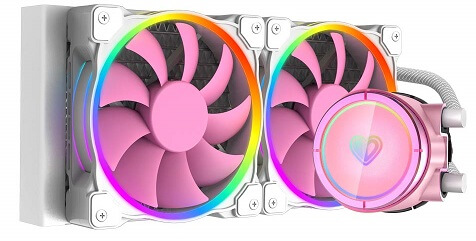
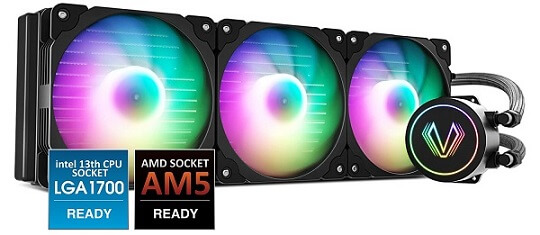
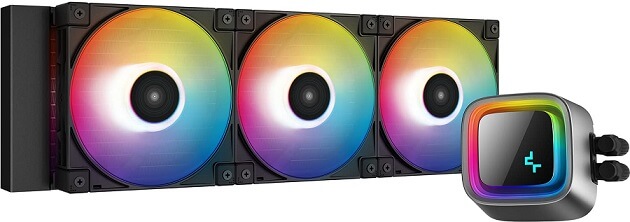

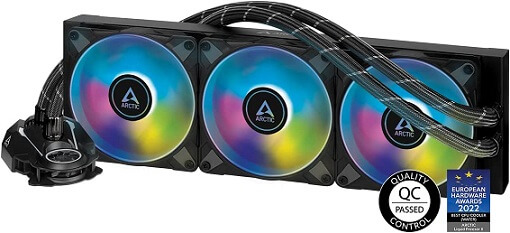
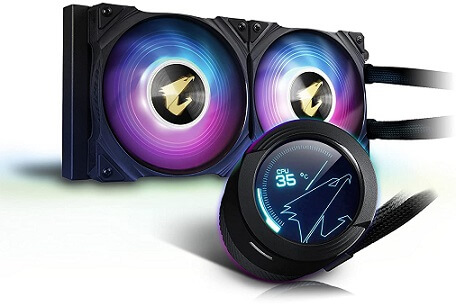
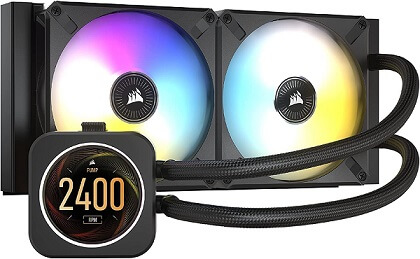
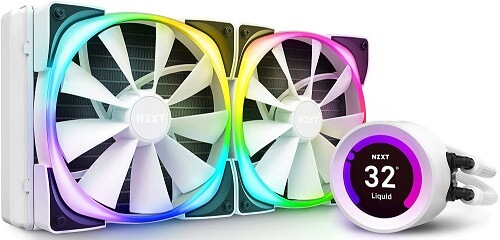


![]()